Main Menu
Latest Blog Entry
User login
In pursuit of excellence: level 3 strength and conditioning course
“Perfection is unobtainable, but if we chase perfection we can catch excellence”
Vince Lombardi
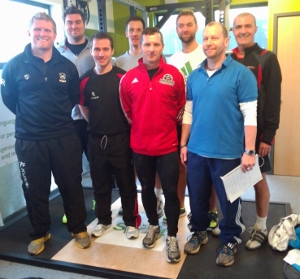 This was the underlying theme of the first weekend of the Level 3 strength and conditioning course .
This was the underlying theme of the first weekend of the Level 3 strength and conditioning course .
Rather than chase 1001 new drills and exercises, we concentrated on refining what we already did, and look at ways of coaching it better.
The candidates are all Level 2 S&C coaches already, with most of them being coaches in their own sport too. This meant they were familiar with a lot of exercises, basic planning and how it impacts their athletes.
The level 3 looks a lot more at yearly planning and the sequencing of sessions around sports practice. I have seen other coaches desperately trying to fill out there folder the day before their level 3 sports course and I wanted none of that short cutting here.
Rather than wallowing around in a cesspit of mediocrity, I want this group of candidates to dig deep, challenge themselves and each other. This means having standards.
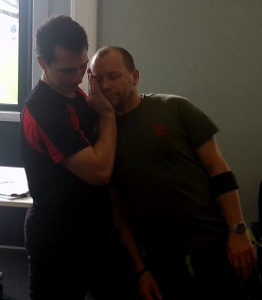 Whilst Bill Sweetenham may have taken it too far by saying “compromise is a cancer“, I see far too many coaches settling for second best, or letting poor sloppy, techniques and habits slide.
Whilst Bill Sweetenham may have taken it too far by saying “compromise is a cancer“, I see far too many coaches settling for second best, or letting poor sloppy, techniques and habits slide.
Standards mean precision in execution, being a role model, and knowing your scope of practice.
(In case you think I am being elitist, I am talking about standards at every level: I turn up on time, professionally dressed and try my hardest every week when dealing with 5 yr olds in the Willand school playground for “wake n’ shake“).
“Get the athlete to leave the building with something”
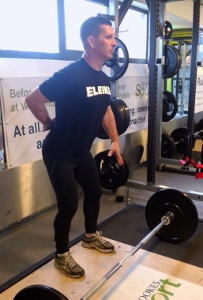
Marius
was one of Marius Hardiman’s coaching tips on the weightlifting workshop. It is easy for athletes to get demoralised (especially when doing lifting where often the last lift is a failed attempt) so Marius gets them to finish with a “win” like doing back squats.
This 3 hour part of the course was an excellent example of an expert in their field providing not only technical knowledge but simple coaching cues (Marius is an ex lifter and Head Coach at Oxford Power Sports pictured with candidates).
We looked at preparation before lifting, snatch progressions and finally the “stuff for neanderthals” the clean and jerk.
What I especially liked was how Marius had a Plan B and a Plan C for when each lifter, in case they found a derivation or progression tricky. Sometimes this was a completely different exercsie; but more often it was a subtle tweak of position or emphasis.
I was conscious about this all relating back to training for sport, so we had lots of talk about how we apply this in rugby, rowing, cricket and tennis. Although Marius doesn’t work with footballers “because they ain’t hard enough“!
“What is the most important attribute in an athlete?”
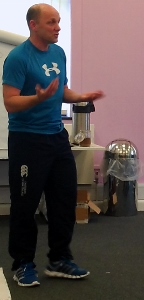
Andy
asked our 2nd Guest Tutor Andy Ellis. I had asked Andy to review exercise anatomy and physiology, and get the coaches to see how and when they can use it to underpin their decision making.
Although Andy did cover some of the detail such as “Hydrogen ions are the evil thing“, he mostly challenged the coaches to ask more questions. They needed to be questioning all the time: especially when reading research papers!
“Need and struggle are what excite and inspire us; our hour of trimuph is what brings the void” William James.
Andy talked about working with athletes in the 16-18 year age group (his main area of experience). A good tip was to find the most important things that are going to stop them from developing. In this age group it is normally peer pressure.
He then gave some good advice on “trusted sources”of advice, which is important when filtering out the enormous amount of “noise” that is published each year. “This is what I know now” was Andy’s preface to statements, admitting that this is a changing ladnscape, so we have to be careful at being dogmatic.
Interestingly, in what was supposed to be an 2 hour presentation on physiology, Andy kept referring back to “attitude” of the athlete and the coaches.
Summary
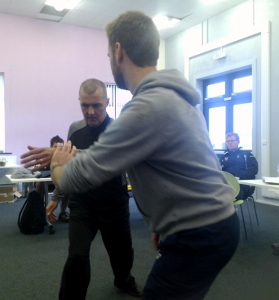 Due in some part to me having a sore throat, this weekend was highly interactive, with a lot of questions and practical demonstrations from the coaches (Mark showing Duncan some pushing hands).
Due in some part to me having a sore throat, this weekend was highly interactive, with a lot of questions and practical demonstrations from the coaches (Mark showing Duncan some pushing hands).
If, indeed, learning is a “social phenomenon” and an “active process” we may be on track.
I am looking forward to the next weekend when the coaches present their findings on performance benchmarks for their sports.
John Brierley will be presenting on skill development and also his experiences running the Athletics Teams at the Delhi Commonwealth games.
If you are interested in joining the Excelsior community of practice, then book onto one of our coaching courses.
Client Testimonials
 Millfield School
Millfield School
For the past 2 years, as Head of Athletic Development, James has made a significant contribution to the development and understanding of athletic development among our sports programmes. With knowledge and passion, he has continually championed best practise in relation to the athletic development of young athletes, and been unstinting in the rigour of its delivery. As a coach, James has made a direct contribution to the development of several prominent individuals, as well as more broadly to our squads.
More


Comments
[…] In pursuit of excellence […]